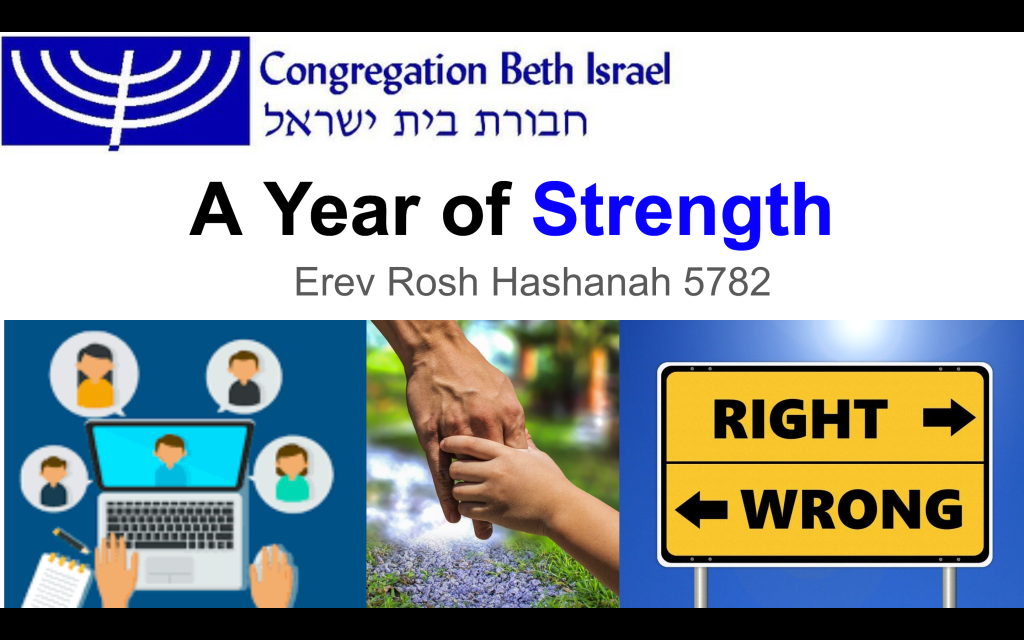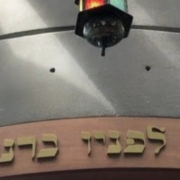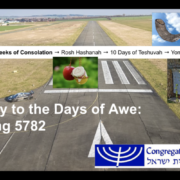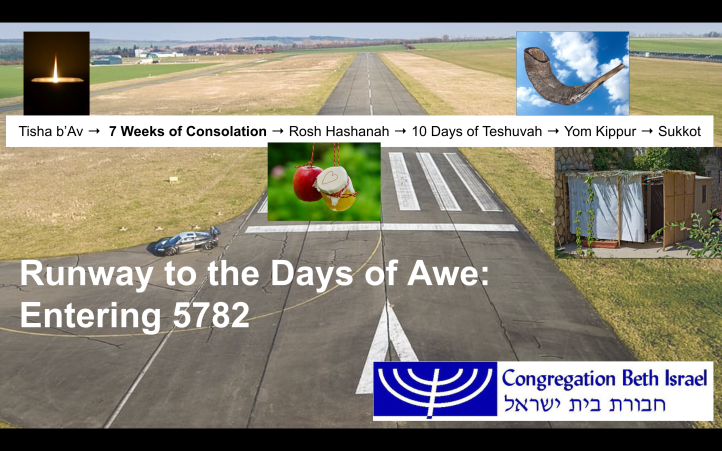On Sunday evening I offered a tiny pearl of introduction to this year’s high holiday theme of gevurah. Yesterday morning we talked about the strength it takes to help each other find hope.
Today our exploration of gevurah comes via the Torah reading for this morning.
Our mystics taught that God’s infinity is revealed in creation through a series of sefirot, divine qualities or emanations. These are the channels through which God’s infinite energy flows into the world, and we associate each one with a quality that we and God share. Like chesed, lovingkindness — last year’s high holiday theme. And gevurah, boundaries and strength and power and discernment — this year’s theme.
When our mystics look at the figures in Torah, they associate different characters in Torah with each of the sefirot. Abraham is associated with chesed, lovingkindness. His tent was open on all sides, he rushed to prepare a feast for visitors, he represents flowing love. And his son Isaac is associated with gevurah.
One of the reasons why Isaac is associated with this spiritual quality is surely the story we just heard, the “binding of Isaac.” How do we see Isaac’s strength in this story? Arguably, what we see is him holding still and letting himself be bound. Maybe he feels powerless, or overwhelmed, or out of control: we don’t know, because Torah doesn’t tell us! But to me, his gevurah has a kind of stoic, silent perseverance to it. He holds still and trusts that he will make it through somehow.
Abraham showed tremendous gevurah earlier in Torah. In midrash, we learn that his father was a builder of idols, and young Avram smashed them. It’s a great story: Terach comes home, all of the idols in his shop are smashed save one, and the biggest one has a stick in its hand. And he yells, what did you do?! and Avram says, “oh, it wasn’t me, dad, the big one did it.” And his father says, “You know they’re just stone. They can’t move!” and Avram retorts, “so why do you worship them, then?” It took gevurah to stand up to his dad.
Or earlier in Genesis, when God disclosed intentions to destroy Sodom and Gomorrah. Remember, Avraham pushed back: what if there are fifty righteous there, what if there are forty, all the way down to ten. But when it comes to Sarah casting-out Ishmael in yesterday’s Torah reading, Avraham doesn’t do much. He tells God he doesn’t like it, but he doesn’t challenge it. And in today’s story, God makes an outrageous request and Avraham just… does it. As Rabbi Danya Ruttenberg notes, he’s a hero when it comes to the outside world, but with his own sons, he falls far short of offering the protection they need.
One of my favorite ways of reading Torah is to place ourselves in the shoes of everyone in the story. Through the lens of Torah we can see ourselves refracted in new ways. And in empathizing with everyone in Torah’s story, we strengthen our capacity to stand in the shoes of another.
How does it feel to empathize with each figure in today’s story, to feel-into where they are?
Maybe Isaac’s kind of gevurah resonates for us, eighteen months into this pandemic. The pandemic has highlighted so many ways we aren’t in control. We don’t have the power to make COVID-19 go away, and we don’t have the power to require other people to do what’s right. But we can use our strength to accept our circumstances and make the best of the hand we’re dealt.
Isaac must have also felt fear. His father had the knife raised for the strike before the angel intervened. We too feel fear in these pandemic times. What might it mean to follow in Isaac’s footsteps and do what life’s situation asks of us, even when we feel afraid?
I don’t especially want to empathize with today’s portrait of Avraham. But like Avraham who followed instructions in today’s story, we too hear voices — day and night, over the internet and cable news and social media — telling us what to do and why. We may be more like Avraham than we want to realize.
Today’s Torah reading begins with the words, “After these things, God tested Avraham.” in English we call this the “Binding of Isaac,” but Torah calls this a test. I’ve always felt that Avraham failed the test: he should have pushed back. He didn’t exercise the discernment to recognize that God’s instruction here was wrong. Discernment is part of gevurah, too.
Gevurah asks us to discern when the voices we’re listening to are giving us good advice and when they’re not. Sometimes the voices we hear are self-serving or toxic. Some voices today declare that the masks we wear to protect against airborne infection are “muzzles” that take away our freedom. Other voices proclaim that as human beings in a society we have a responsibility to take care of each other. What voices will we heed in 5782?
Recently, as I was studying this story again, my son asked me what I was learning. His Hebrew name is after my maternal grandfather, Isaac — in Hebrew, Yitzchak, the name of the son whom Avraham almost sacrificed. I realized he didn’t really know this story yet. So I told it to him, in outline, curious to know how it would land with him.
(And yes, he gave me permission to tell this story to you today.)
His first reaction was: God — He, or She, or They — probably isn’t giving us the full story here. “God is giving us pieces and parts to figure out for ourselves, but God might overestimate or underestimate us.” And then he said, “Loyalty to God is a good thing, but Abraham could have found a loophole. We have choices. We need to feel in our jellies when we’re treating people wrong or making a wrong choice.”
I said, “You mean, we need to learn to use our discernment?” Yes, he said. That’s a good word for it.
We need to use our discernment to know when the voices we’re following are aligned with our highest values — and when they’re not. Discernment is another way of saying, gevurah.
It’s also noteworthy who’s not in this story. Sarah appears nowhere in this part of the narrative. The next thing we read, after this story, is that Sarah died at 127. From that juxtaposition one midrash imagines her hearing the news from afar, perhaps in a garbled form indicating that her husband actually sacrificed their son, and dying on the spot.
After the way we saw Sarah behave yesterday — banishing Hagar and Ishmael into the desert — I don’t especially want to empathize with Sarah, either! But when I place myself in her shoes, I can feel her grief and horror at the news of her child’s death. (Of course, that news turns out to be wrong. Fake news, as it were. But she still grieves — and dies.)
It takes gevurah to place ourselves in someone else’s situation. It takes gevurah to rein in our own reactivity so we can empathize with someone’s heartbreak even if their past behaviors made us angry. Empathy might seem like an expression of chesed, lovingkindness — but I think it requires our gevurah.
Maybe this feels a little bit uncomfortable. Maybe we don’t want to empathize with people who we perceive made bad choices. That’s a very human response. To our ancestors, it was also an angelic one!
We see this in a midrash on part of the Exodus story. When we crossed the sea, Talmud says, the angels rejoiced when the waves crashed in and washed away the Egyptians. This is Pharaoh and his army we’re talking about. They had caused unimaginable suffering. And God says, “the works of My hands are dying, and you want to sing praises?!” Like — what’s the matter with you; develop some empathy, would you?! For this reason we pour out drops of juice or wine, symbol of joy, from our second cup at seder. We diminish our joy because someone else suffered in our journey to liberation.
Not wanting to empathize with someone we don’t like or don’t agree with is a very human reaction… and that midrash comes to teach us that Jewish values ask us to rise above that reaction.
Gevurah is how we balance between feeling our righteous anger, and reining in our anger so that we don’t lose empathy. Gevurah is in how we exercise judgment, especially when it comes to which voices we will heed and amplify. Gevurah is in the strength to be still and trust sometimes, and the strength to take bold action sometimes, and the discernment to know which times are which.
And gevurah is what allows us to be alert for possibilities of hope that we hadn’t previously considered — like the ram that appears at the last second in today’s Torah reading, the source of hope that was waiting just outside our vision’s frame.
This is Rabbi Rachel’s d’varling from the second morning of Rosh Hashanah (cross-posted to Velveteen Rabbi.)
















